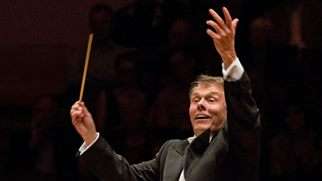|
Back
Honor Thy Hornist Father New York
Stern Auditorium, Carnegie Hall
11/08/2019 - & November 1, 2019 (Cologne)
Richard Strauss: Four Symphonic Interludes from Intermezzo, Op. 72 – Four Last Songs
Johannes Brahms: Symphony No. 4 in E minor, Op. 98
Diana Damrau (soprano)
Bavarian Radio Symphony Orchestra, Mariss Jansons (chief conductor)

M. Jansons
“Once more I’ve only chucked together one of those sets of waltzes and polkas.”
Brahms to Max Kalbeck
“This set of ‘waltzes and polkas’ turned out to be the E minor symphony!”
Robert Haven Schauffler, The Unknown Brahms
The similarities are striking. Both Brahms and Richard Strauss had fathers who were horn players. Both interlaced their compositions with poignant passages for the horn, reminders of their filial responsibilities and ingrained memories.
This much-anticipated concert turned out to be rather a poignant one. It was clear from the outset that Maestro was not well, his gait very slow and hesitant. Still, he persevered and led this small orchestra in a delicate version of the song “Dreaming by the Fireside” and delivered a charming “At the Card Table” with its romantic string quartet opening and its general waltz-like conceit. A somewhat shaky but poignant opening gambit.
Although Strauss wrote two horn concerti, his most poignant solo for his father’s instrument is in the Four Last Songs, an incredible combination of beauty, regret and nostalgia. However, before its presentation we were treated to an ironic excerpt of burlesque. After the remaining forces assembled themselves onto the stage to supplement the small group of players from the opening gambit there was a long period of silence, followed by one of irony. Eventually someone in a suit came out to center stage and began to speak so softly that none of us could hear him. Once he started over at the insistence of the audience, he revealed that Ms. Damrau had a head cold but would soldier on.
Trooper that she is, Ms. Damrau was her usual poignant self in the Strauss Vier letzte Lieder although her volume was somewhat adjusted downward due to her condition. Both September and Going to Sleep were little gems, the horn and solo violin superbly poignant in these two songs respectively. Jansons looked unwell, but persevered.
After the doors had closed to reign in the audience for the second half of the program there was a very, very long silence. The players all sat quietly until the audience finally erupted in rhythmic clapping. The door opened so that their leader could appear but he did not. After the door closed with no conductor on board the crowd became even more restless and some of us were quite worried. After another long silence punctured by audience bad behavior Mr. Jansons finally appeared and struggled to walk to and mount the podium. After this grand guignol the ensemble delivered a rather unremarkable Brahms 4. This concert was ultimately disconcerting and we wish the best for Maestro going forward.
This concert was all the more poignant when one remembers the horse race between maestro and Lorin Maazel. Jansons worked the players long and hard, delivering a fine entry for the final competitive performance of Bruckner. But Maazel was more savvy, dismissing the troops after only a brief read-through, thus winning the hearts and minds of the players and, ultimately, the posting. What might have been...
Fred Kirshnit
|